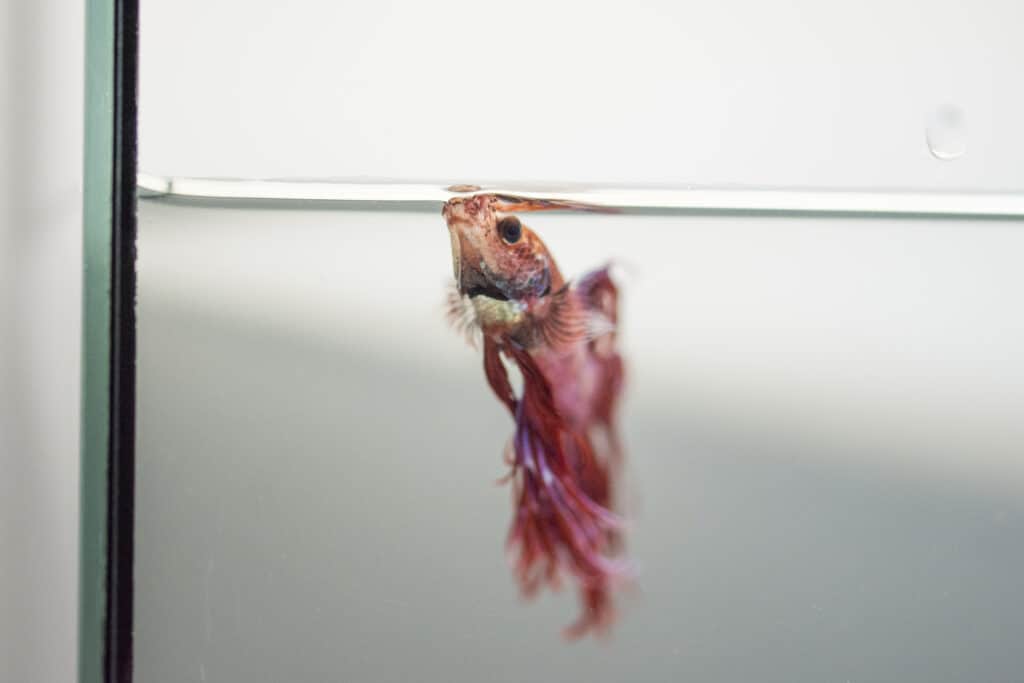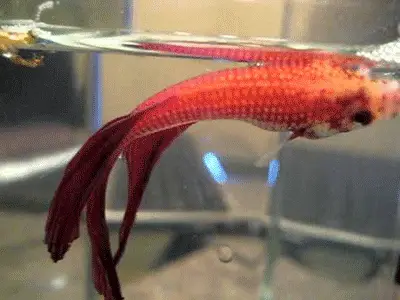As a betta fish owner, it can be a disheartening experience to find your beloved pet motionless in their tank. However, before jumping to conclusions, it’s essential to understand the signs that indicate whether your betta fish is dead or alive.
In this article, we’ll explore the various indicators that can help you determine the status of your betta fish. By paying attention to these signs, you can take the necessary steps to ensure the health and well-being of your betta fish. So, let’s dive in and learn how to tell if your betta fish is dead or alive.
To find out if your Betta fish is dead, you can check for the following signs: motionless body, no gill movement, no response to tapping the tank, no eye movement, and no breathing. You can also check for discoloration and fungus growth. If you observe any of these signs, your Betta fish may be dead. However, you can confirm by gently touching or moving the fish to see if there is any response.

How Do I Know if My Betta Fish is Dead?
If you’re a betta fish owner, the thought of your beloved pet passing away can be devastating. However, it’s important to know how to identify the signs of a deceased betta fish so you can properly dispose of it and ensure the health of any other fish in the tank. In this article, we’ll go over the telltale signs of a dead betta fish and what you should do in the event of its passing.
Physical Appearance
The first thing to look for when determining if your betta fish is dead is its physical appearance. A dead betta fish will typically float at the top of the tank, either on its side or upside down. You may also notice that its eyes are clouded over and its body looks stiff or limp. If your betta fish is exhibiting any of these physical symptoms, it’s likely that it has passed away.
If you’re unsure whether your betta fish is dead or just sleeping, gently nudge it with a net or your hand. A live fish will swim away or twitch in response, while a dead fish will remain motionless.
Behavioral Signs
In addition to physical appearance, there are a few behavioral signs that may indicate your betta fish has passed away. A dead betta fish will not respond to stimuli like food or movement, and it will not swim or breathe. You may also notice that the other fish in the tank are avoiding the deceased betta fish or behaving differently than usual.
If you suspect that your betta fish has passed away, it’s important to remove it from the tank as soon as possible to prevent any health issues for the other fish. Use a net to carefully scoop the fish out of the tank and dispose of it in a way that is respectful and environmentally responsible.
Benefits of Proper Betta Fish Care
While the death of a betta fish can be sad and emotional, it’s important to remember that proper care can help prevent premature deaths and improve the overall health and wellbeing of your fish. Some tips for keeping your betta fish healthy include:
– Maintaining a clean and properly sized tank
– Feeding a balanced diet of high-quality food
– Monitoring water temperature and quality
– Providing plenty of hiding spots and stimulation
By following these tips and keeping a close eye on your betta fish’s health, you can help prevent issues that may lead to premature death and ensure a happy and healthy life for your pet.
Betta Fish vs. Other Fish Types
Betta fish are a popular choice for aquariums due to their vibrant colors and unique personalities. However, it’s important to note that they have specific care requirements that may differ from other fish types. For example, betta fish are known for their aggressive behavior and should not be kept in a tank with other aggressive fish. They also require warm water temperatures and may not thrive in a tank with colder water.
Before adding a betta fish to your aquarium, it’s important to do your research and ensure that you can provide the proper care and environment for your pet. This will help prevent issues that may lead to premature death and ensure a happy and healthy life for your betta fish.
Conclusion
In summary, identifying the signs of a dead betta fish is important for the health of your other fish and the overall maintenance of your aquarium. Look for physical symptoms like floating and clouded eyes, as well as behavioral signs like lack of response to stimuli. By providing proper care and attention to your betta fish, you can help prevent issues that may lead to premature death and ensure a happy and healthy life for your pet.
Frequently Asked Questions
As a betta fish owner, it is important to know how to identify if your fish is alive or dead. Here are some commonly asked questions about determining the health of your betta fish.
How do I know if my betta fish is dead?
There are a few signs that your betta fish may be dead. The first thing to look for is movement. If your betta fish is not moving and is floating either at the top or bottom of the tank, it may be dead. You can also check for breathing. If your betta fish is not breathing, this is a sign that it may have passed away.
Another way to tell if your betta fish is dead is by checking its eyes. If the eyes are cloudy or glazed over, this could be a sign of death. Additionally, if your fish is not responding to food or other stimuli, it may be dead.
What should I do if my betta fish is dead?
If your betta fish is dead, it is important to remove it from the tank as soon as possible. Leaving a dead fish in the tank can cause problems with the water quality and can lead to other health issues for your remaining fish. You can dispose of the fish by burying it or by placing it in a sealed bag in the trash.
After removing the dead fish, it is important to perform a water change to ensure that the tank stays clean and healthy for your remaining fish. You may also want to monitor the other fish in the tank for any signs of illness or stress.
What can cause my betta fish to die?
There are many factors that can contribute to the death of a betta fish. Some of the most common causes of death include poor water quality, overfeeding, and stress. Additionally, diseases and infections can also be a factor in the death of a betta fish.
To keep your betta fish healthy, it is important to maintain a clean and stable environment. This includes regular water changes, feeding your fish a balanced diet, and providing them with a stress-free environment.
Can a betta fish come back to life?
Unfortunately, once a betta fish has died, there is no way to bring it back to life. While there are some instances where a fish may appear to be dead but is actually in a state of shock, this is rare and should not be relied upon. If you suspect that your fish is dead, it is best to remove it from the tank and take steps to ensure that your other fish stay healthy.
If you are concerned about the health of your betta fish, it is important to seek the advice of a veterinarian or a fish expert who can help you address any issues and keep your fish healthy.
How long can a betta fish survive without food?
Betta fish can survive for several days without food. However, it is not recommended to leave your betta fish without food for an extended period of time. Feeding your betta fish a balanced diet is important for its overall health and well-being.
If you are going to be away from home for an extended period of time, you can use an automatic fish feeder to ensure that your fish is still getting the nutrients it needs. Alternatively, you can have a friend or family member stop by to feed your fish while you are away.

10 ways to tell if a betta fish is dying – Betta fish informational video
In conclusion, it can be difficult to determine whether your betta fish is dead or alive. However, there are several signs that can help you determine if your fish is no longer with us.
First, check for signs of movement. If your fish is not moving or swimming, it may be a sign that it has passed away. Additionally, look for signs of discoloration or unusual behavior. A betta fish that is no longer alive may have a dull or discolored appearance, and may also float on the surface of the water.
Lastly, it’s important to remember that betta fish are living creatures that require proper care and attention. Making sure that your fish has a clean and healthy environment, and is receiving the proper nutrition and care, can help prevent premature death. If you suspect that your betta fish has passed away, it’s important to take the necessary steps to dispose of the body properly and ensure that your other fish are not at risk of illness.
